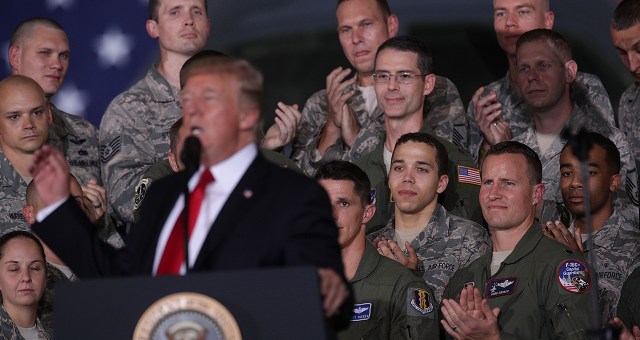
U.S. military veterans are largely supportive of the way Donald Trump is leading the nation’s armed forces. A new Pew Research Center survey of veterans finds that a majority (57%) approve of the way Trump is handling his duties as commander in chief, with about half (48%) saying his administration’s policies have made the military stronger. Veterans’ assessments of the president on these and other military-related issues are more positive than those of the general public.
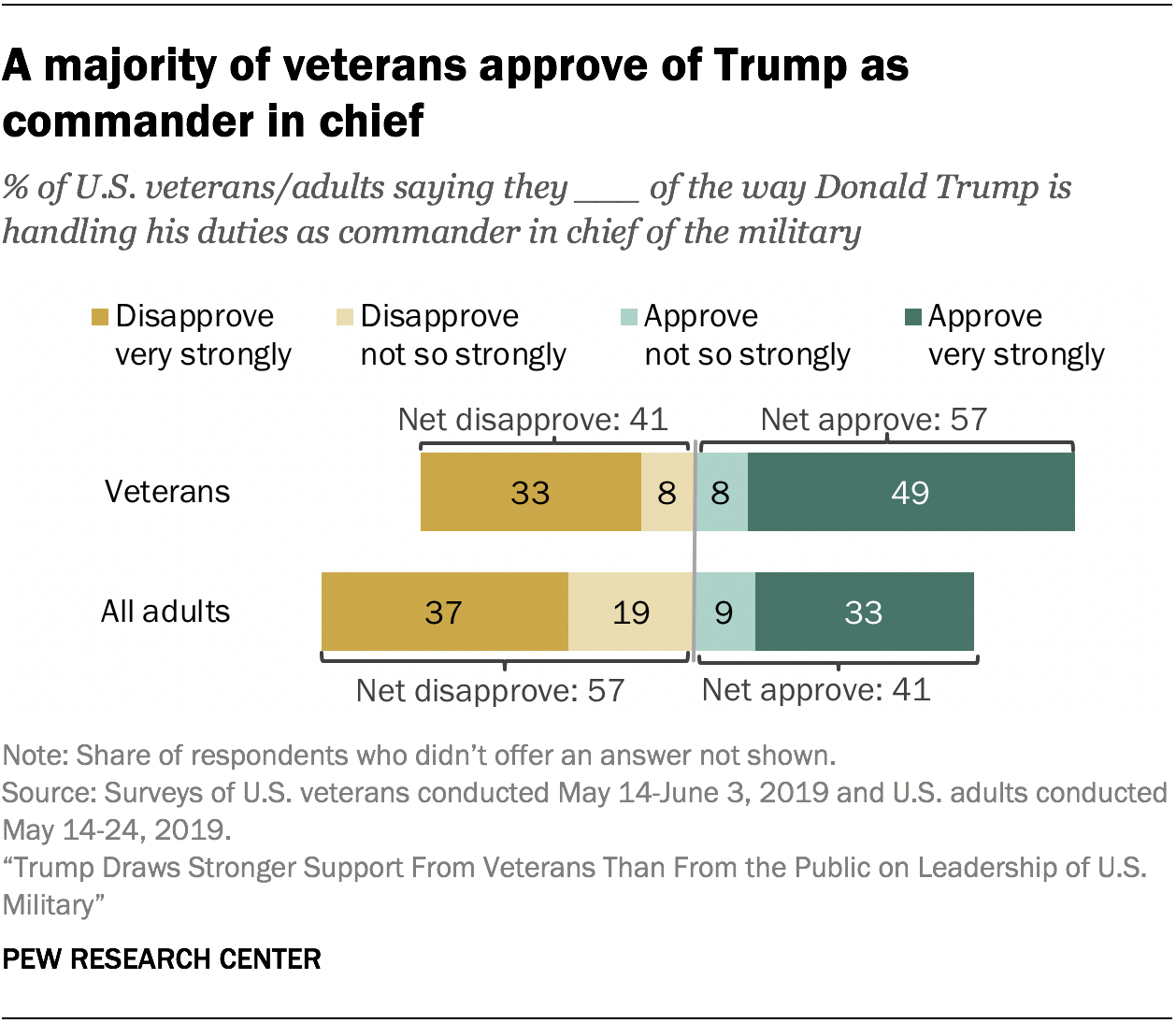
Even so, significant shares of veterans are dissatisfied with Trump’s leadership. Nearly half (45%) say he doesn’t listen enough to military leaders in making national security decisions, and a similar share say they have little trust in him to make the right decisions about the use of military force.
There are deep partisan divisions among veterans on these issues, just as there are within the public. Veterans who identify as Republican or Republican-leaning have a much more positive view of Trump’s leadership of the military than their Democratic counterparts. They are more likely to favor Trump-supported policies, such as the ban on transgender people serving in the military and the deployment of troops to the U.S.-Mexican border, and they are more likely to approve of Trump’s approach to dealing with key allies and adversaries.
The gap in views between veterans and the general public in part reflects the fact that veterans as a group are more likely to identify with or lean toward the Republican Party.1 Roughly six-in-ten veterans (59%) identify as Republican or Republican-leaning, compared with 44% of all U.S. adults. Meanwhile, 39% of veterans identify as Democrats or lean toward the Democratic Party, compared with 51% of all adults.
Even after taking these partisan differences into account, veterans stand out from the public in some instances, with Republican veterans particularly enthusiastic about the president’s leadership on military issues.
These findings come from two new surveys: one of 1,284 U.S. military veterans, conducted May 14-June 3, 2019, and a parallel survey of 1,087 U.S. adults, conducted May 14-24, 2019.
About nine-in-ten Republican veterans approve of Trump as commander in chief
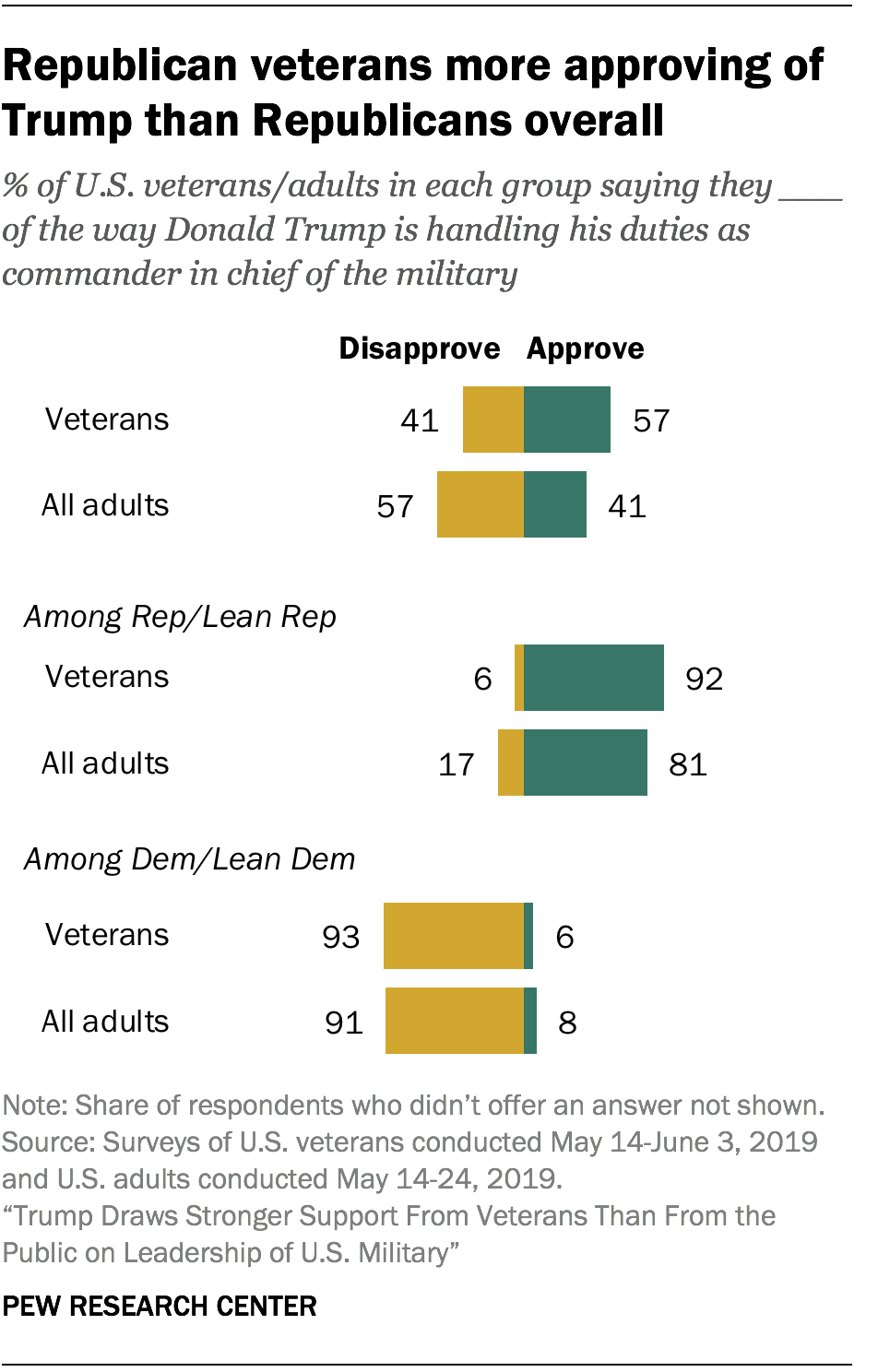
Veterans give Trump higher ratings in handling the job of commander in chief of the military than members of the public overall. About six-in-ten veterans (57%) approve of the job Trump is doing as commander in chief, compared with 41% of Americans who say the same. Still, roughly four-in-ten veterans (41%) disapprove of the job Trump is doing in this role, including a third who strongly disapprove.
Republican veterans are far more approving of Trump than their Democratic counterparts. Roughly nine-in-ten veterans (92%) who identify as Republican or who lean toward the Republican Party approve of Trump as commander in chief, compared with just 6% of veterans who identify as Democrats or lean Democratic.
Republican veterans are also more supportive of Trump than Republicans overall – 81% of Republicans in the general public approve of the way Trump is handling his role as commander in chief. By contrast, Democratic veterans and Democrats in the general public have similar assessments of the president. Just 6% of Democratic veterans and 8% of Democrats overall approve of Trump’s leadership of the military and 93% and 91%, respectively, disapprove.
The partisan divide in views of Trump among the military and all Americans mirrors the partisan divide in views of Barack Obama when he was commander in chief. A 2011 Pew Research Center survey of veterans found that 77% of Democratic veterans approved of Obama’s performance as commander in chief, as did 78% of Democrats overall. Among Republican veterans, 81% disapproved of Obama’s handling of the military as did 69% of Republicans overall.
Among today’s veterans, approval of Trump does not differ significantly by era of military service. Looking specifically at veterans who served before 9/11 and those whose service extended beyond 9/11, nearly identical shares say they approve of the way Trump is handling his job as commander in chief. In addition, there is no significant gap in views between veterans who served as commissioned officers, non-commissioned officers or those who were enlisted.
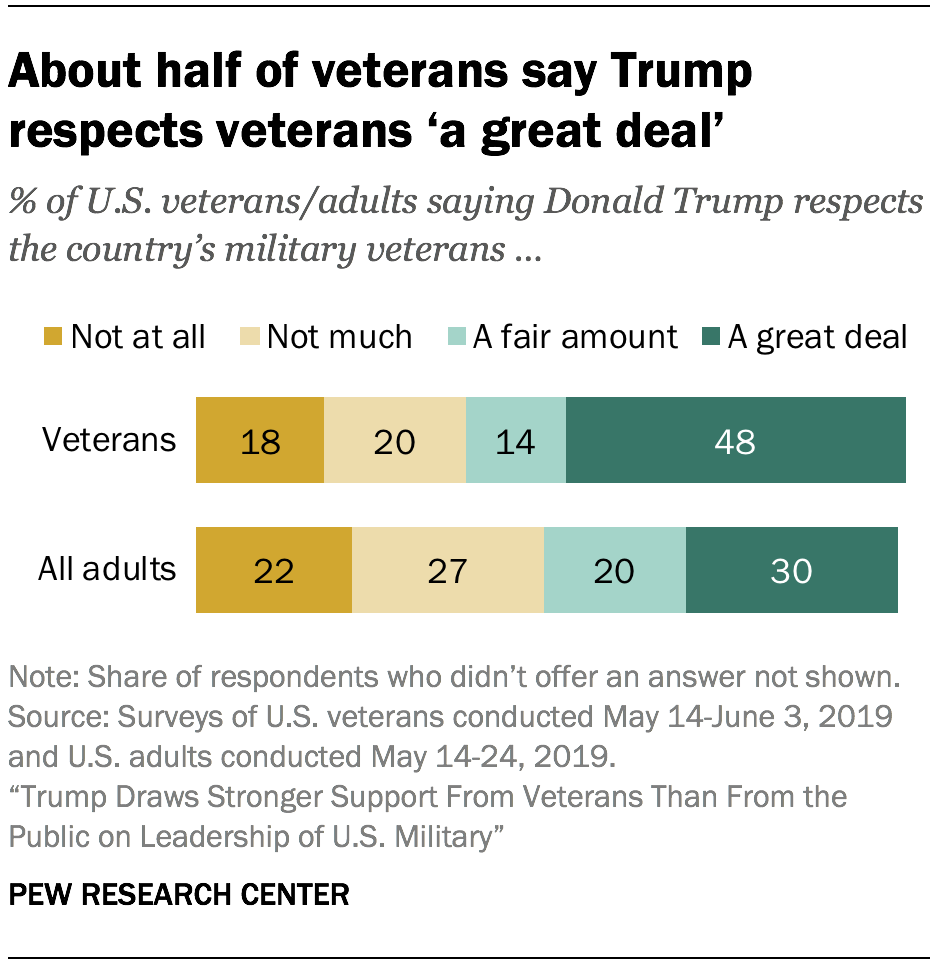
Veterans are more likely than members of the public to say Trump respects military veterans. About half (48%) say Trump respects veterans a great deal, compared with 30% of all Americans. An additional 14% of veterans say Trump respects veterans a fair amount while about four-in-ten say Trump does not respect veterans much (20%) or at all (18%).
Older veterans are more likely than their younger counterparts to say Trump respects veterans a great deal. Some 54% of veterans ages 65 and older say this, compared with 40% of those younger than 50. Male veterans are 17 percentage points more likely than their female counterparts to say Trump respects veterans a great deal (50% vs. 33%).
Here, again, partisanship sharply divides veterans’ views. Fully 78% of Republican veterans say Trump respects the country’s veterans a great deal, compared with just 4% of Democratic veterans who say this. Instead, a majority of Democratic veterans say the president doesn’t respect veterans much (43%) or at all (43%).
About half of veterans say the policies of the Trump administration have made the military stronger
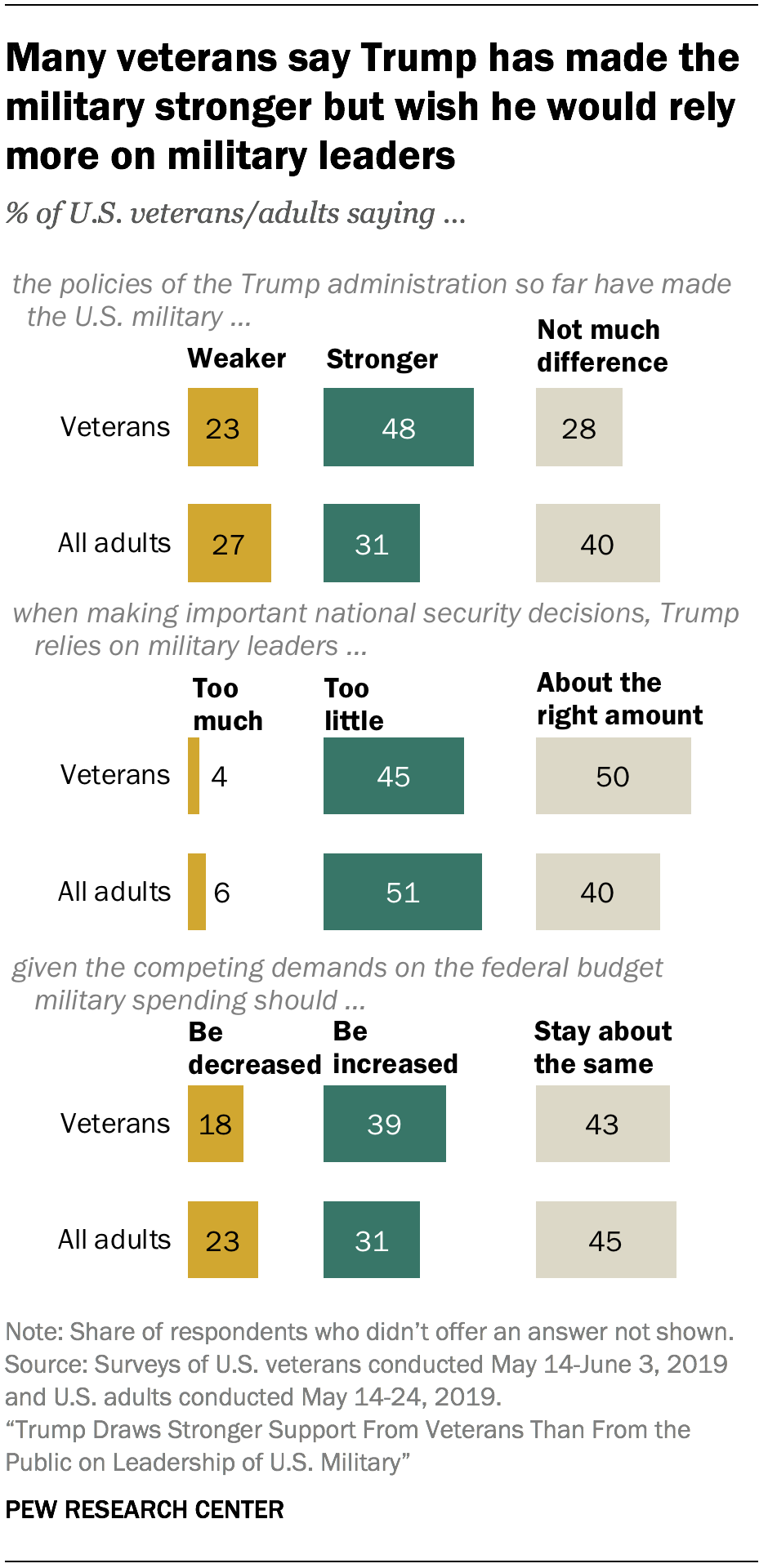
In thinking about the policies of the Trump administration, a sizable share of veterans (48%) say that they have made the U.S. military stronger. About one-quarter (23%) say his policies have made the military weaker, and 28% say they have not made much of a difference. By comparison, the general public is less upbeat about the impact Trump’s policies have had on the military. About three-in-ten Americans (31%) say these policies have made the military stronger, and 27% say they have made it weaker. Four-in-ten Americans say they haven’t made much difference.
Among veterans, those who served before 9/11 are more likely than those who served after to say that Trump administration policies have made the military stronger (50% vs. 40%). This pattern holds when controlling for differences in partisanship between the two groups.
Still, many veterans say the president has not listened to military leaders enough when it comes to national security decisions. Nearly half of veterans (45%) say Trump listens to military leaders too little. A similar share says Trump listens about the right amount (50%). The public is somewhat more likely than veterans to say the president listens to military leaders too little (51%) and less likely to say the right amount (40%). Just 6% of Americans and 4% of veterans say Trump listens to military leaders too much.
When it comes to military spending, more veterans say it should be increased (39%) than say it should be decreased (18%). A sizable share of veterans (43%) say military spending should stay about the same as it is now. The public is somewhat more likely to want a decrease in military spending. The survey finds that 23% of Americans think military spending should be decreased, 31% would like to see it increased, and 45% think it should stay about the same as it is now.
Here, too, views divide sharply by partisanship. The vast majority of Republican veterans think military spending should be increased (48%) or stay the same (47%). Among Democrats, 25% would like to see spending increased, 37% want a decrease, and 38% think it should stay about the same.
Many veterans question Trump’s ability to make wise decisions about the use of force, nuclear weapons
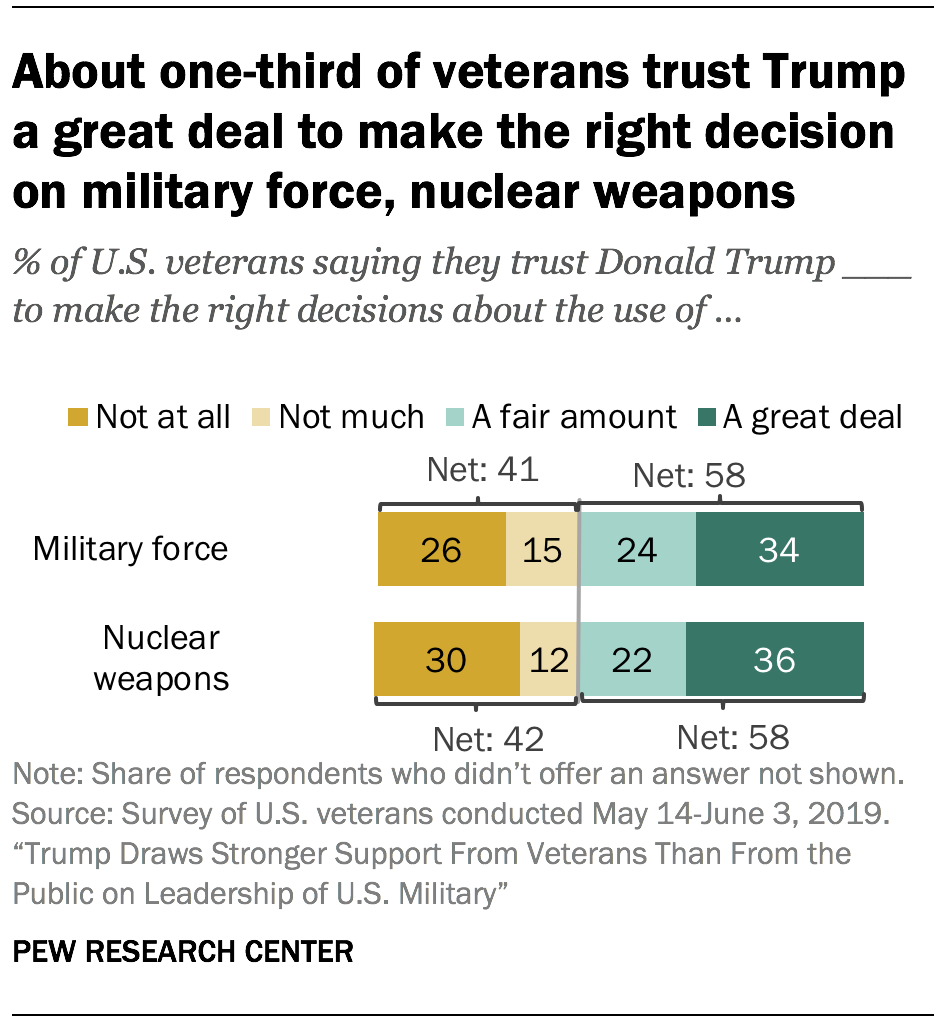
A majority of veterans say they trust Trump to make the right decisions about the use of military force and nuclear weapons. Roughly a third (34%) say they trust the president a great deal to make the right decisions about the use of military force, and an additional 24% say they trust Trump a fair amount when it comes to these decisions. Roughly four-in-ten veterans do not trust Trump much in making these decisions, including 26% who say they do not trust the president at all when it comes to the use of military force.2
Similarly, a majority of veterans say they trust Trump a great deal (36%) or a fair amount (22%) to make the right decisions about nuclear weapons, while 42% say they don’t trust him much to make these decisions. Notably, 30% of veterans say they don’t trust Trump at all to make the right decisions about using nuclear weapons.
The public is less trusting of Trump when it comes to these decisions. Roughly four-in-ten adults say they trust him a great deal (22%) or a fair amount (20%) to make the right decisions on the use of military force, and a similar share trust him a great deal (21%) or a fair amount (20%) to make the right decisions about the use of nuclear weapons. Majorities say they don’t trust him much or at all to make these types of decisions.
Among veterans, those who served before 9/11 are more likely to trust Trump when it comes to the use of nuclear weapons than those who served more recently. While 38% of pre-9/11 veterans say they trust the president a great deal to make the right decisions on the use of nuclear weapons, 30% of post-9/11 veterans say the same. This pattern holds, even when taking into account the differences in partisanship between the two groups.
Veterans who say they had an emotionally traumatic experience while in combat are less likely to trust Trump in making decisions about the use of force than are those who didn’t have that type of experience (27% and 37%, respectively say they have a great deal of trust). The pattern is similar when it comes to Trump making decisions on the use of nuclear weapons.
Republican veterans are more approving of Trump’s military policies than Republicans overall
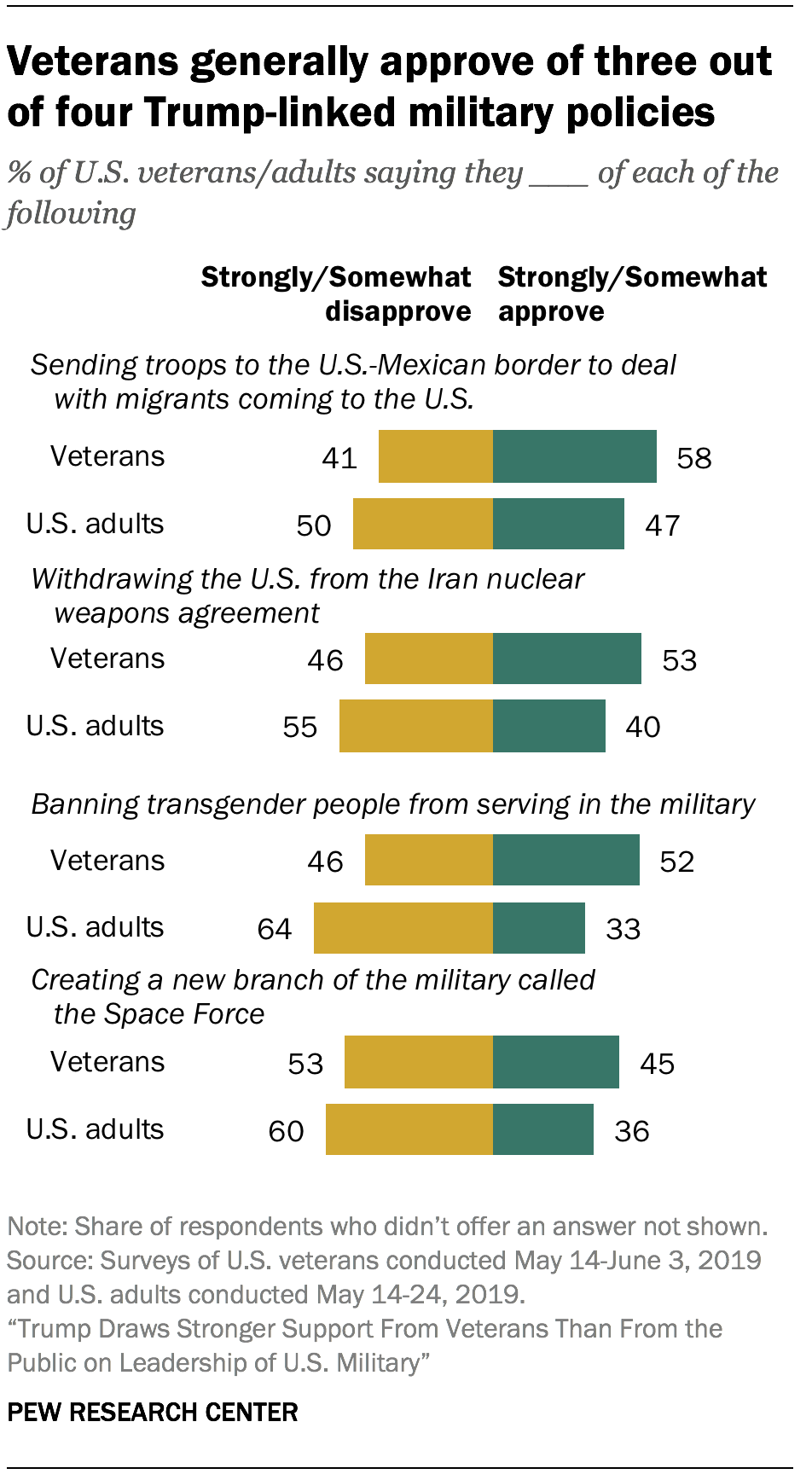
Veterans are divided over some of Trump’s specific military policies, but in each case, they are more supportive than the general public. Veterans also have a more positive view than Americans overall about Trump’s approach in dealing with North Korea, Russia and America’s NATO allies.Even after accounting for differences in partisanship between the groups, Republican veterans are generally more supportive of Trump’s positions than Republicans overall.
A majority of veterans (58%) approve of sending troops to the U.S.-Mexico border to deal with migrants coming to the U.S., including 42% who strongly approve of this policy. The public is more evenly split: 47% approve (including 28% who strongly approve) and 50% disapprove.
Veterans are more evenly divided in their views on the U.S. withdrawing from the Iran nuclear weapons agreement: 53% approve of this decision, while 46% disapprove. Roughly four-in-ten veterans (38%) strongly approve of this policy. Among the public, a majority (55%) disapproves of the U.S. withdrawing from the Iran agreement, while 40% approve of this move. Veterans are twice as likely as the public to say they strongly approve of this policy (38% of veterans vs. 19% of all adults).
Veterans are also somewhat divided in their views on banning transgender people from serving in the military: 52% of veterans approve of this Trump-supported policy (with 35% saying they strongly approve), while 46% disapprove. Veterans’ opinions diverge significantly from the public on this issue. Only a third of Americans approve of banning transgender people from the military, with 64% disapproving of the measure.
Of the Trump-supported policies asked about in the survey, the only one which veterans disapprove of, on balance, is the idea of creating a new branch of the military called the Space Force: 45% of veterans approve of this proposal and 53% disapprove. Just 15% of veterans strongly approve of creating this new branch of the military. The public is even less enthusiastic about the possibility of creating a Space Force, with 36% of all adults approving and 60% disapproving.
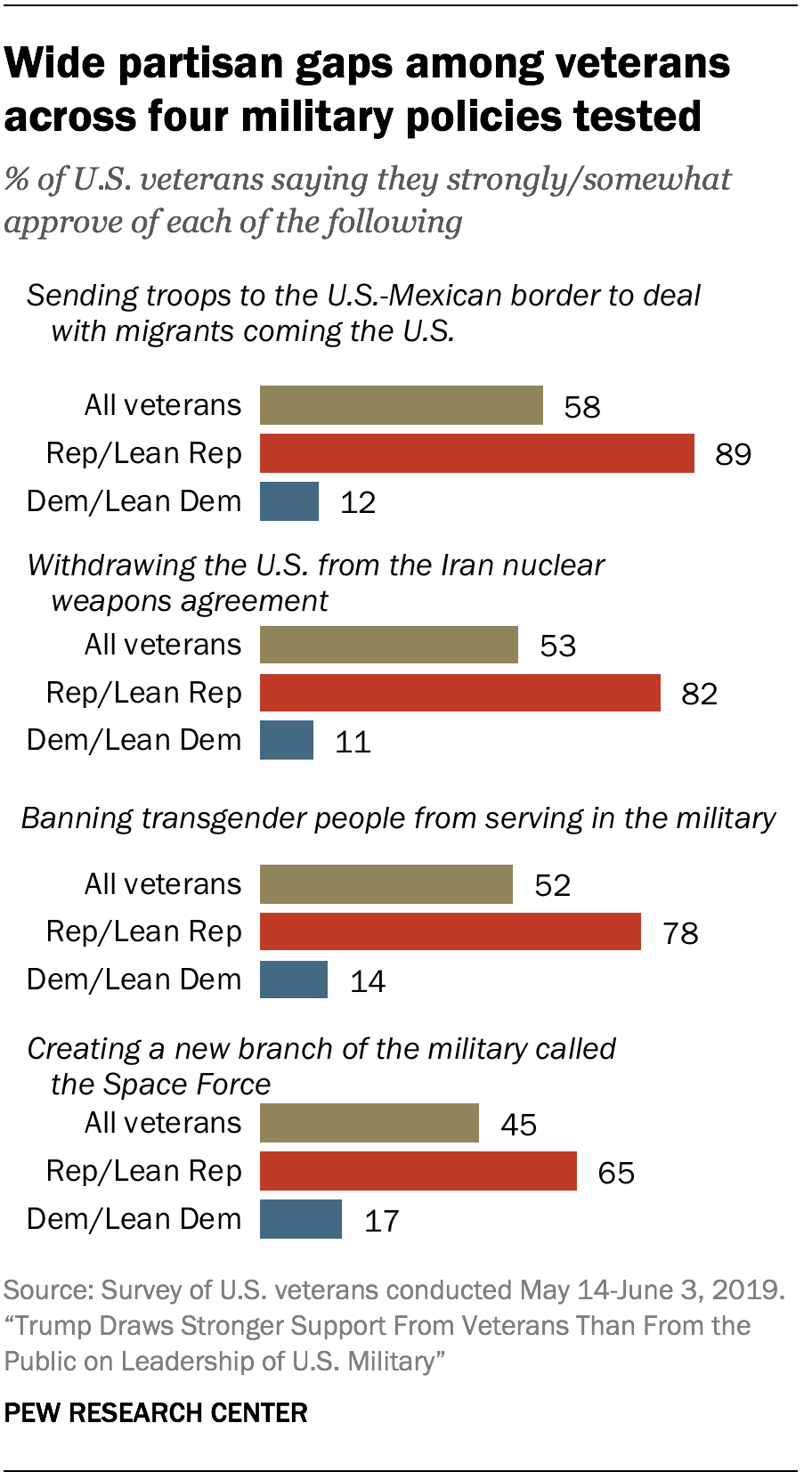
On each of these issues, veterans’ opinions differ significantly by party with Republicans much more supportive than Democrats. For example, 89% of Republican veterans approve of sending troops to the U.S.-Mexico border; only 12% of Democratic veterans approve. Similarly, 82% of Republican veterans approve of withdrawing the U.S. from the Iran nuclear deal; only 11% of Democratic veterans feel the same.
These party differences are also seen in public views on these issues, although in each case, Republican veterans are even more supportive of Trump policies than Republicans overall. The largest differences between Republican veterans and Republicans overall can be seen on banning transgender people from serving in the military (78% of veterans approve vs. 57% of all Republicans) and withdrawing from the Iran nuclear weapons deal (82% approve vs. 65%).
Veterans are divided on how Trump is dealing with Russia, while Americans overall disapprove
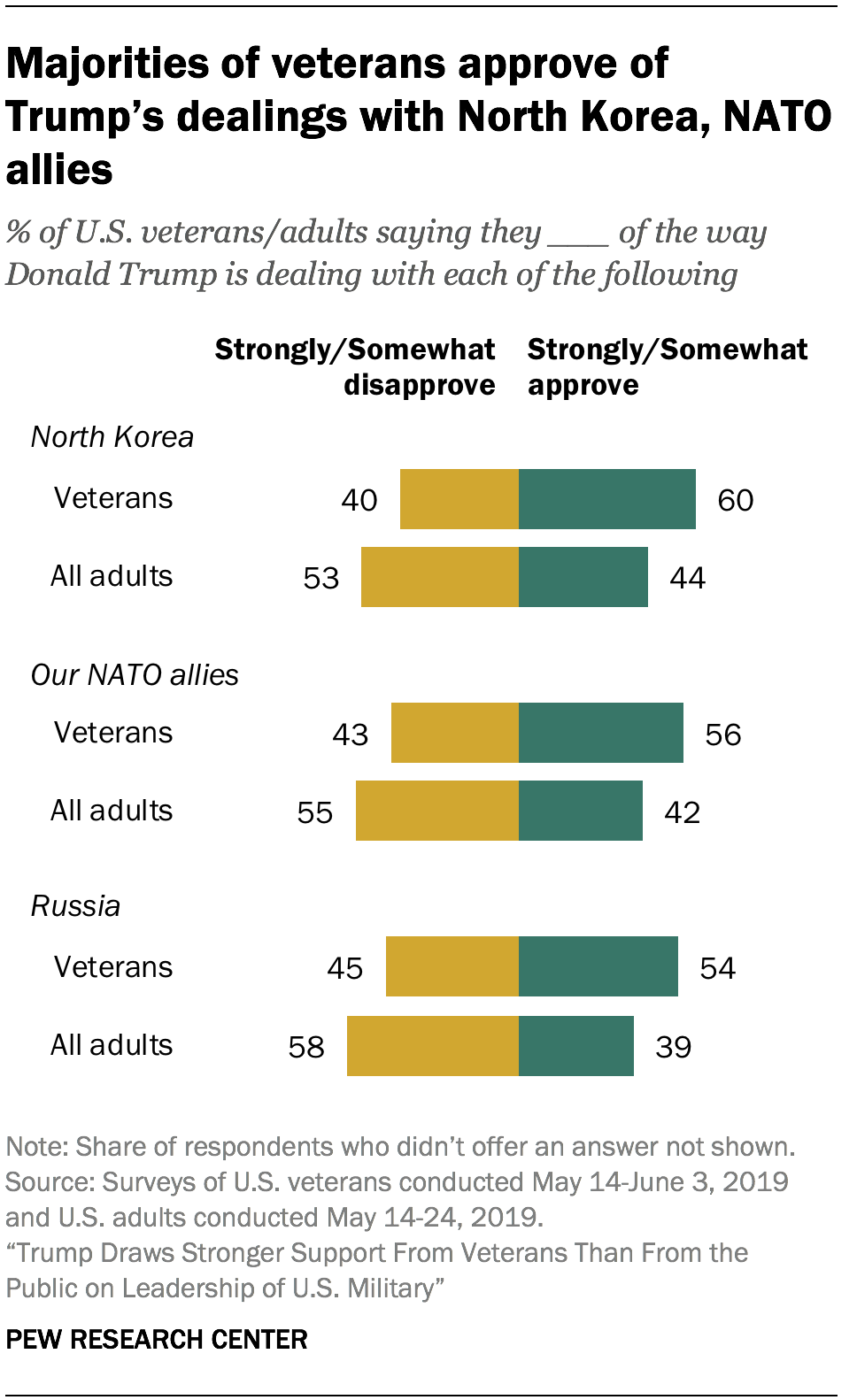
A majority of veterans (60%) approve of Trump’s dealings with North Korea (including 35% who strongly approve), while 40% disapprove. Among all Americans, more disapprove than approve of Trump in this regard (53% vs. 44%).
Views on the way Trump is dealing with America’s NATO allies follow a similar pattern. A slight majority of veterans (56%) approve of Trump’s dealings with NATO (34% strongly approve), while 43% disapprove. Among the public, opinion tilts toward disapproval: 55% disapprove while 42% approve.
Veterans are more likely to approve of how Trump is dealing with Russia than to disapprove (54% vs. 45%). The opposite is true among Americans overall, where a majority (58%) disapproves of his dealings with Russia, while only 39% approve.
Here again, Republican veterans are more likely than Republicans in the general public to approve of Trump’s dealings with all three entities. There are fewer differences among Democratic veterans and all Democrats, with similar shares approving of Trump’s performance.